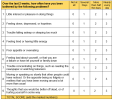Depression as a moderator and mediator of functional status in patients with Long COVID: a cross-sectional and longitudinal observational study from the PERCEIVE cohort in Australia
BACKGROUND
In patients with post-acute sequelae of COVID-19 (PASC), depression has been associated with symptom severity, the duration since infection and ongoing functional impairment. However, the interconnections between these factors remain inadequately understood.
OBJECTIVES
This study aimed to explore the roles of depressive symptoms in moderating and mediating the relationships between post-COVID-19 conditions and functional capacity.
METHODS
The PERCEIVE study recruited 1794 participants from Victoria and Tasmania through online advertisements based on possible PASC for a cross-sectional study. Of these, 461 participated in the longitudinal study. Post-COVID-19 duration and symptoms were recorded, and depressive symptoms and functional capacity were self-reported using the 9-item Patient Health Questionnaire and the Duke Activity Status Index (DASI), respectively. The association of depression with functional capacity was explored using ordinary least squares (OLS) regression, with companion OLS models, Sobel-Goodman tests and 1000 bootstrap iterations to assess mediation. Longitudinal data were analysed to assess changes in functional capacity and depressive symptoms over time, with mediation analysis using mixed models to explore depression as a mediator.
RESULTS
Participants had a mean DASI score of 35 (SD 21). Fatigue (18%), shortness of breath (11%) and chest pain (6%) were common symptoms, with severe depression linked to fatigue (93%) and shortness of breath (66%). The severity of post-COVID-19 symptoms was associated with severe depression (β=6.31, 95% CI 5.42 to 7.21) and reduced functional capacity (β=−6.40, 95% CI −9.20 to –3.61), with depression mediating 36% of the association between post-COVID-19 symptom severity and functional capacity. PASC was associated with higher depression scores (β=2.06, 95% CI 1.15 to 2.97) and lower functional capacity (β=−3.99, 95% CI −6.21 to –1.77), with depression mediating 51% of the association between PASC and reduced functional capacity. The longitudinal analysis suggested that depression is associated with the relationship between PASC and changes in functional capacity over time (unstandardised estimate=−5.16, p<0.001).
CONCLUSION
Depression plays a key role in exacerbating post-COVID-19 functional impairment. This observation underscores the need for targeted physical and mental health interventions to enhance long-term recovery for those with severe conditions.
Web | DOI | PDF | BMJ Open | Open Access
Binyam Tariku Seboka; Joel Smith; Kristyn Whitmore; Brodie Baranow; Erin Howden; Jayashri Kulkarni; Quan L Huynh; Thomas H Marwick
BACKGROUND
In patients with post-acute sequelae of COVID-19 (PASC), depression has been associated with symptom severity, the duration since infection and ongoing functional impairment. However, the interconnections between these factors remain inadequately understood.
OBJECTIVES
This study aimed to explore the roles of depressive symptoms in moderating and mediating the relationships between post-COVID-19 conditions and functional capacity.
METHODS
The PERCEIVE study recruited 1794 participants from Victoria and Tasmania through online advertisements based on possible PASC for a cross-sectional study. Of these, 461 participated in the longitudinal study. Post-COVID-19 duration and symptoms were recorded, and depressive symptoms and functional capacity were self-reported using the 9-item Patient Health Questionnaire and the Duke Activity Status Index (DASI), respectively. The association of depression with functional capacity was explored using ordinary least squares (OLS) regression, with companion OLS models, Sobel-Goodman tests and 1000 bootstrap iterations to assess mediation. Longitudinal data were analysed to assess changes in functional capacity and depressive symptoms over time, with mediation analysis using mixed models to explore depression as a mediator.
RESULTS
Participants had a mean DASI score of 35 (SD 21). Fatigue (18%), shortness of breath (11%) and chest pain (6%) were common symptoms, with severe depression linked to fatigue (93%) and shortness of breath (66%). The severity of post-COVID-19 symptoms was associated with severe depression (β=6.31, 95% CI 5.42 to 7.21) and reduced functional capacity (β=−6.40, 95% CI −9.20 to –3.61), with depression mediating 36% of the association between post-COVID-19 symptom severity and functional capacity. PASC was associated with higher depression scores (β=2.06, 95% CI 1.15 to 2.97) and lower functional capacity (β=−3.99, 95% CI −6.21 to –1.77), with depression mediating 51% of the association between PASC and reduced functional capacity. The longitudinal analysis suggested that depression is associated with the relationship between PASC and changes in functional capacity over time (unstandardised estimate=−5.16, p<0.001).
CONCLUSION
Depression plays a key role in exacerbating post-COVID-19 functional impairment. This observation underscores the need for targeted physical and mental health interventions to enhance long-term recovery for those with severe conditions.
Web | DOI | PDF | BMJ Open | Open Access


